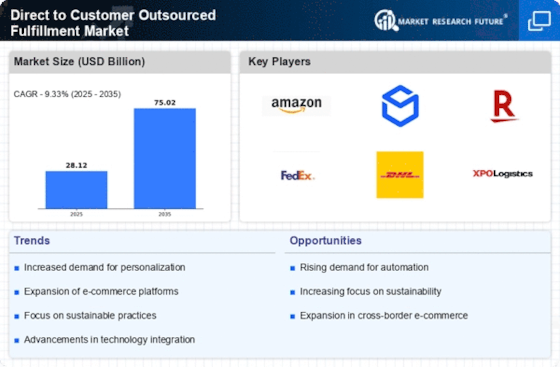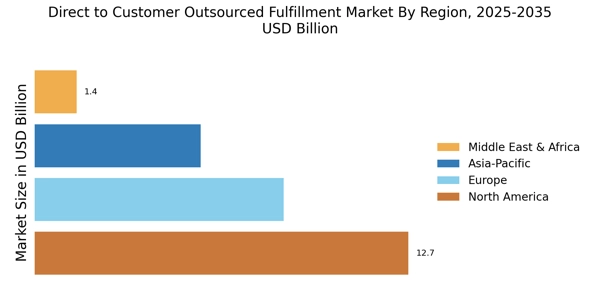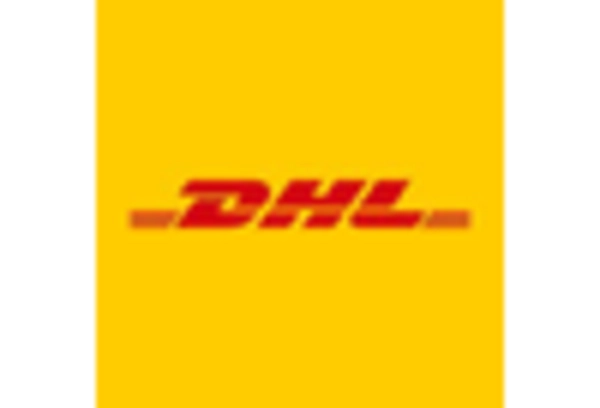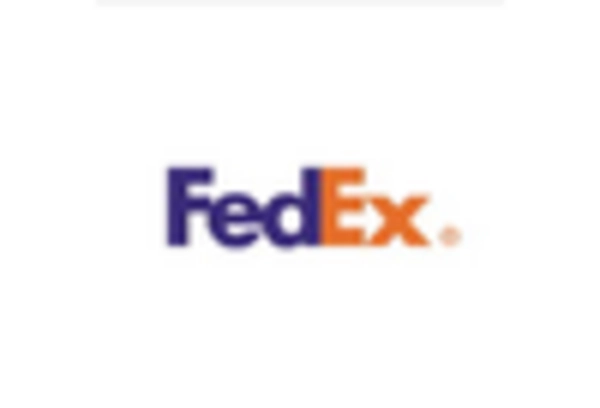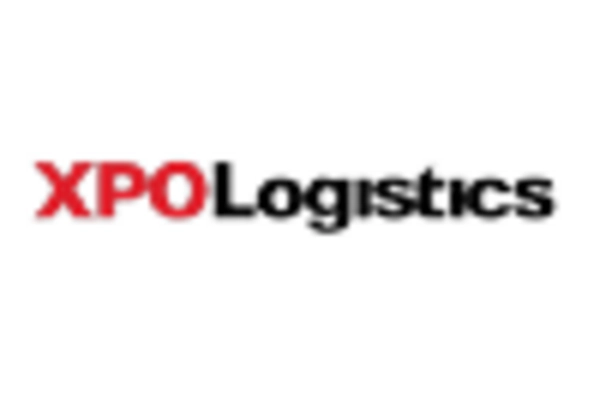Cost Efficiency
Cost efficiency remains a paramount concern for businesses operating within the Direct to Customer Outsourced Fulfillment Market. Outsourcing fulfillment services can lead to substantial savings in operational costs, as companies can avoid the expenses associated with maintaining in-house logistics. By partnering with specialized fulfillment providers, businesses can benefit from economies of scale, reducing shipping costs and improving overall profitability. In 2025, it is estimated that companies can save up to 30% on logistics costs by outsourcing their fulfillment operations. This financial incentive encourages more businesses to consider outsourcing as a viable strategy, thereby propelling growth in the Direct to Customer Outsourced Fulfillment Market.
E-commerce Growth
The Direct to Customer Outsourced Fulfillment Market is experiencing a notable surge due to the rapid expansion of e-commerce. As consumers increasingly prefer online shopping, businesses are compelled to enhance their fulfillment capabilities. In 2025, e-commerce sales are projected to reach approximately 6 trillion USD, indicating a robust demand for efficient fulfillment solutions. This growth necessitates outsourcing fulfillment services to manage inventory, shipping, and returns effectively. Companies that leverage outsourced fulfillment can focus on core competencies while ensuring timely delivery to customers. The increasing reliance on digital platforms for purchasing goods is likely to drive further investment in outsourced fulfillment services, thereby shaping the landscape of the Direct to Customer Outsourced Fulfillment Market.
Technological Advancements
Technological innovations are significantly influencing the Direct to Customer Outsourced Fulfillment Market. Automation, artificial intelligence, and data analytics are transforming traditional fulfillment processes, enabling companies to optimize their operations. For instance, the implementation of automated warehousing solutions can reduce order processing times by up to 50%. Furthermore, AI-driven inventory management systems allow businesses to predict demand more accurately, minimizing stockouts and overstock situations. As technology continues to evolve, companies that embrace these advancements are likely to gain a competitive edge in the fulfillment landscape. The integration of technology into outsourced fulfillment services is thus a pivotal driver in the Direct to Customer Outsourced Fulfillment Market.
Focus on Customer Experience
Enhancing customer experience is increasingly recognized as a vital driver in the Direct to Customer Outsourced Fulfillment Market. Companies are prioritizing seamless and personalized shopping experiences to differentiate themselves in a competitive landscape. This focus on customer satisfaction extends to fulfillment processes, where timely and accurate order delivery plays a crucial role. Research indicates that 90% of consumers are likely to return to a brand that provides a positive delivery experience. As businesses strive to meet these expectations, many are turning to outsourced fulfillment solutions that can provide the necessary expertise and resources. This emphasis on customer experience is likely to shape the future of the Direct to Customer Outsourced Fulfillment Market.
Consumer Expectations for Speed
In the Direct to Customer Outsourced Fulfillment Market, consumer expectations for rapid delivery are escalating. Customers now anticipate receiving their orders within a few days, if not hours, of placing them. This shift in consumer behavior compels businesses to adopt more agile fulfillment strategies. According to recent surveys, nearly 80% of consumers express a preference for same-day or next-day delivery options. As a result, companies are increasingly outsourcing their fulfillment operations to specialized providers who can meet these demands efficiently. The ability to offer expedited shipping not only enhances customer satisfaction but also fosters brand loyalty, making it a critical driver in the Direct to Customer Outsourced Fulfillment Market.


